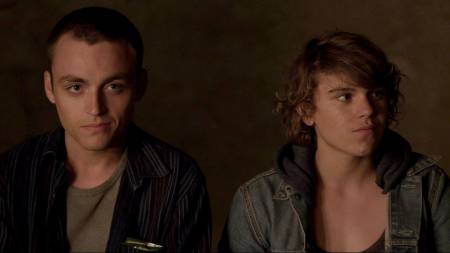 JULES PELISSIER, ZACHARIE CHASSERIAUD IN THE GOOD LIFELiving outside convention, for a while
JULES PELISSIER, ZACHARIE CHASSERIAUD IN THE GOOD LIFELiving outside convention, for a while In Jean Denizot's first feature loosely based on the story of Xavier Fortin, arrested in the Pyrenees in 2009, Sylvain (Zacharie Chasseriaud, who resembles Emile Hirsch) and Pierre (Jules Pelissier), 16 and 18, live an idyllic life in the country with their father Yves (Nicolas Bouchaud) close to nature, free, not bothering to go to school. But not so free -- it turns out he abducted them during a bitter custody battle, and has been traveling around on the lam with them for eleven years. When the police seem to be closing in, evidently not for the first time, Pierre gets fed up with the situation, desperate for sex, a car, and a life of his own, disappears without a word. As Sylvain and his father go on hiding, the younger boy, the center of the action, also feels the confinement of the situation -- heightened when he meets a girl, Gilda (Solène Rigot ), and they become attached. Gilda has hard times too: she's had to grow up alone with her father, an alcoholic doctor, functional at work but a disaster at home. Both have had very bittersweet childhoods.
The situation parallels that of Sidney Lumet's classic 1988 River Phoenix vehicle
Running on Empty, except that those kids are in school, and the parents are joined by principle, radicals hiding from the FBI. Phoenix's character chooses to step away from them despite a fierce loyalty (felt also by Sylvain and Pierre), because his remarkable musical talent requires nurturing. But in both cases, being on the run becomes an impossible limit on a youth's fulfillment.
In some ways this French movie is more enthusiastically American than Lumet's. It begins with nature-boy scenes accompanied by an US country song; before his disappearance, Pierre is reading a French translation of
Huckeleberry Finn, peruses by Syvain after he's run off, and later Yves and Sylvain are running down a river on a sort of raft. Country music comes again to bring a larky feel, balancing humor and danger as some Westerns do. Gilda reels Sylvain in for a lighthearted meet-cute: fishing, she catches the undershorts he's lost skinny dipping and is madly swimming in search of. This Americanism may be a bit obvious, and the action winds up feeling a little too low-keyed for its own good, the Mark Twain references a bit obvious. Anyway, the danger vanishes in the jaunty sounds of blue grass, which Justin Chang damningly but not inaccurately calls in his
Variety review "laying on a thick glaze of faux Americana with a trowel."
"To be kidnapped by your own father represents both a nightmare and a total fusion with your model," Denizot has commented. As with
Running on Empty, Sylvain and Pierre's father in his way lives by idealistic rules, and Denizot has noted how "intelligent and cultured" the two boys where when they were interviewed on the radio, despite their not having gone to school. Well, maybe so. But despite a suggestion that Sylvain has given some critical thought to religion,
The Good Life can't match either the complexity of
Running on Empty nor the memorable, emotional performances. Nor can the rather bland scenes between Sylvain and Gilda compete with the the ironies and intensities of River Phoenix and real-life girlfriend Martha Plimpton. What
The Good Life does have is a wild outdoorsy feel and handsome photography of rural France by Elin Kirschfink. And Chasseriaud and Rigot are natural together. The film's best moments are near the end when Sylvain is torn between his father, his girlfriend, and joining his brother. It's Pierre who has found "the good life" -- being his own man, with a job, independent. The final scenes have their own strong emotion. The last shot is a zinger.
The Good Life/La belle vie, 93 mins., debuted at Venice; showed in a few other festivals. French theatrical release from 9 April 2014. AlloCiné press rating 3.4. Screened for this review as part of the San Francisco Film Society's French Cinema Now series, November 6-9, 2014.






